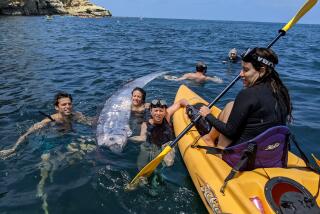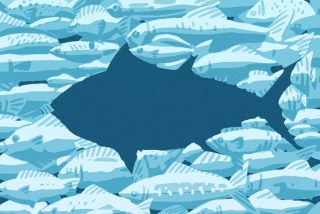The Big Ones That Didn’t Get Away : San Pedro Fishermen Net Financial Bonanza, Place in Record Book with Catch of Pacific Blue Fin Tuna
- Share via
San Pedro commercial fishermen operating south of Santa Rosa Island off the Southern California coast in the past six days have netted a virtual school of giant Pacific blue fin tuna--including the largest ever caught.
Japanese buyers have already bought the entire catch, and the giant fish were quickly processed, packed in ice and flown to Tokyo, where they will bring high prices on the booming Tsukiji fish market. Sale of the fish brought a financial bonanza to the fishermen.
Using 2,400-foot nets, Southern California fishermen have landed 187 giant tuna, each 6 to 8 feet long and weighing 300 to 625 pounds. One San Pedro boat, the Pioneer, caught 105 with one setting of its net.
The San Pedro waterfront is buzzing with excitement. “I’ve been fishing all my life up and down the Pacific coast from Alaska to South America and have never seen or heard of fish this size,” said Tony (Mama) Vidovich, 63, echoing the sentiments of other veteran fishermen.
Vidovich, as official weigher for the local fishermen’s union, weighed each giant fish brought into San Pedro this week, including the biggest Pacific blue fin tuna ever caught, a 625-pounder taken by the Pioneer, a 92-foot purse seiner.
Marine biologists for the National Marine Fisheries Service and the Inter-American Tropical Tuna Commission are just as excited as the fishermen.
“We have no idea why these fish are suddenly showing up or why they have grown so old and are so big,” said Bill Bayliff, senior biologist in La Jolla with the tuna commission. “Age determines size, and it is obvious these are old, old fish--a bunch of senior citizens swimming together in schools.”
The previous record blue fin tuna landed in the Pacific Ocean was a 531-pound fish caught off Anacapa Island by a commercial fishing boat in 1984.
“In that instance, it was a single fish caught in a net with much smaller fish,” noted Ron Dotson, 38, fishery biologist with the fisheries service in La Jolla.
“Historically, we know of blue fin tuna
caught in the 300-pound range in the 1930s and 1940s in the western Pacific, but nothing near the size of the monsters being landed this week have ever been caught anywhere in the Pacific Ocean.” A larger variety of blue fin tuna grows in the Atlantic Ocean.
Blue fin tuna spawn in the Pacific Ocean off Japan and migrate back and forth 6,000 miles in each direction from Japan to the coastal waters off Southern California, Mexico, and Central and South America.
Hit the Jackpot
Besides the fish caught by the Pioneer, the rest were landed by five other boats: the Sea Scout, the Tootur, the Ferringo Boy, the St. George and the Restituta.
The Pioneer and its nine-member crew struck it rich late Monday night and early Tuesday morning south of Santa Rosa Island, which lies about 50 miles southwest of Santa Barbara.
“This has been one of the poorest years ever for us, then all of a sudden--boom!--in one night and six hours we hit the jackpot,” said John Mattera, 30, a fisherman aboard the Pioneer, which is owned and skippered by his father, Benny Mattera, 51.
State Fish Co. of San Pedro offered Mattera $7 a pound for the entire 36,726-pound catch. The owner of the Pioneer had the option of selling the fish outright or giving them on consignment to Japanese buyers for a percentage of the auction price in Tokyo.
Mattera and his crew opted to take the $7 a pound, bringing them $257,082. The boat’s percentage is 51%, and the crew’s 49% share is divided equally among the owner and his eight fishermen, netting each man $13,996.69 for the night’s work. State Fish will receive a percentage of the Tokyo sale price.
“It’s like hitting the lottery,” mused Bert Nurse, the Pioneer’s 62-year-old engineer and a fisherman since he was 9 years old. Nurse, who sports a handlebar mustache and a tattoo of a huge snake running up his right arm, said: “It’s been feathers all year. We finally got the chicken.”
The Pioneer set a net in the middle of the school of giants Monday night and caught nothing. The second set was the lucky one. The net was slowly hauled in and each of the 105 fish was lifted gingerly in a sling and lowered into the hold. It took six hours to bring in and unload the fish from the net and 10 hours to make the run back to San Pedro.
Built in 1944
For the fishermen aboard the Pioneer, it was their first paycheck in three months. They have had repeated dry runs on trips in local waters that lasted sometimes a day, sometimes longer than a week.
“A real good month for us is a $60,000 to $70,000 catch for the boat. But this year our luck has been terrible up to now. So, you can see what this means to us,” John Mattera said. “The Pioneer is an old boat, built in 1944. She needs a lot of work.” Weathered and rusted, the Pioneer is in dire need of a paint job and an overhaul.
“The boat’s share of the catch, more than $125,000, will be used to buy a new engine, new fuel pump, to bring her up to par,” the younger Mattera said. “She needs an awful lot of work and now she’ll get it.”
Skipper Isidoro Amalfitano, 47, and his 10 crewmen aboard the 84-foot Sea Scout caught 24 of the big tuna weighing a total of 8,494 pounds the same night that the Pioneer made its record-setting catch. It took Sea Scout’s crew two hours to bring the fish in early Tuesday morning.
If the Sea Scout had accepted $7 a pound, its one-night haul would have been worth $59,458. But Amalfitano and his crew opted to take a percentage of the auction price to be received in a few days in Tokyo.
Japanese connoisseurs relish raw tuna, widely used both for sushi and sashimi. The bigger and older the fish, the more the Japanese are said to value it. The high price does little to dissuade them.
“Fish like these giants will probably bring $30 or more a pound at the Japanese auction,” said Norman Mezin, 61, a lifelong fisherman, fishing boat skipper and seafood buyer in San Pedro.
More to Read
Sign up for Essential California
The most important California stories and recommendations in your inbox every morning.
You may occasionally receive promotional content from the Los Angeles Times.













